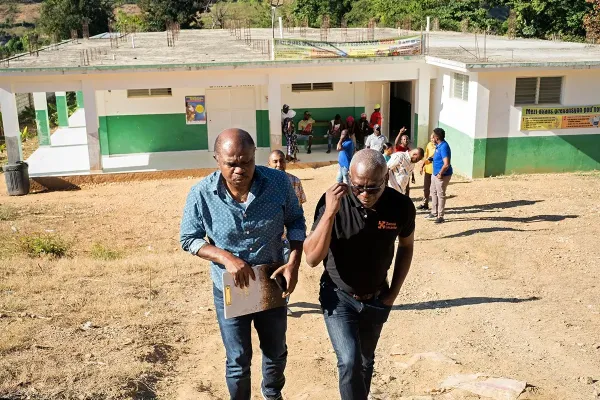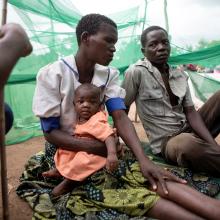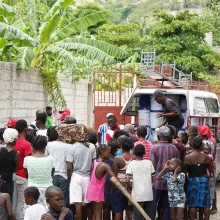Note: This letter was originally published on February 4, 2025, in French and English on Zanmi Lasante’s website.
Starting on January 20 and continuing for weeks afterwards, the new U.S. administration began issuing executive orders that directly impact Partners In Health’s (PIH’s) work and the communities we serve. Most of these orders are ambiguous, deeply harmful, and unprecedented, breeding widespread panic and confusion.
Funding freezes implemented by the U.S. government are straining already fragile public health infrastructure and overburdening essential care delivery programs, including at PIH sites around the world, impacting our staff, patients, and work. This interruption destabilizes decades of progress in global health, amplifies the risk of preventable deaths, and weakens emergency preparedness.
Zanmi Lasante, PIH’s sister organization in Haiti, is painfully aware of how these funding gaps will limit access to care for thousands of local patients. Below is a letter from Wesler Lambert, Zanmi Lasante’s interim executive director, acknowledging how a reduction in funding could reverse years of progress in clinical care:
Dear supporters,
I’ve spent part of the month of January visiting our facilities in the Central Plateau and Lower Artibonite regions. These visits are a core part of my work—allowing me to assess our progress, identify areas for improvement, and engage directly with the staff and patients who make our mission a reality. From our maternal health, malnutrition, and emergency care programs to HIV, tuberculosis, and cancer care, I saw firsthand the impact of our interventions and the challenges we must continue to address.
Patients who once faced certain death are now thriving—receiving lifesaving treatment, supported by dedicated community health workers, and regaining the hope they once lost. These successes are the result of decades of commitment, fueled by the unwavering support of partners like the U.S. Centers for Disease Control and Prevention (CDC) and the President’s Emergency Plan for AIDS Relief (PEPFAR). But today, this progress stands on fragile ground.
Zanmi Lasante is the leading healthcare provider in Haiti after the Ministry of Public Health and Population. Since launching one of the world’s first programs to provide antiretroviral therapy (ART) in a resource-limited setting in 1998, we have defied expectations and demonstrated that treating HIV in poor countries is not only possible but essential. Today, our 12 HIV care sites serve as a lifeline for thousands, driving progress toward the UNAIDS 95-95-95 targets. In Plateau Central, we have already surpassed two of these milestones—ensuring that nearly all people living with HIV know their status and that every diagnosed patient receives treatment. Across both regions, we continue to strengthen viral suppression rates, prevent mother-to-child transmission, and expand access to pre-exposure prophylaxis for at-risk populations.
None of this would be possible without the longstanding support of PEPFAR, the Global Fund, and other key partners. These investments have allowed us to integrate clinical care with vital social support, ensuring that patients not only receive medication but also food assistance, housing support, school fees, and transportation stipends. The backbone of our success is our network of community health workers—accompagnateurs—who provide in-home support, reinforce adherence to treatment, and extend care to even the most remote communities.
Beyond HIV care, these investments have strengthened our entire health system, reinforcing services across maternal health, nutrition, pediatrics, and non-communicable diseases. Our integrated approach ensures that every program benefits from the infrastructure, training, and human resources built through decades of HIV investments. A reduction in funding would not only impact HIV treatment but would ripple across all of our services, limiting access to care for thousands of patients who rely on our hospitals and clinics for survival.
Yet, at a time when we should be redoubling our efforts, we are instead facing the devastating possibility of losing critical funding. The potential rollback of PEPFAR support is not just a bureaucratic decision; it is a direct threat to the lives of thousands of Haitians. It risks undoing two decades of progress, jeopardizing the ability of patients to access treatment, and setting back global efforts to control HIV. Moreover, it threatens to overwhelm an already fragile health system, exacerbating the impact of Haiti’s ongoing crises—including insecurity, economic instability, and the emigration of trained healthcare workers.
Let me be clear: This is not just a Haitian issue. This is a global health and human rights concern. Haiti has been a proving ground for what is possible in global HIV care, influencing policies and inspiring similar initiatives worldwide. The lessons learned here have shaped international strategies, informed global policy, and demonstrated that universal HIV treatment is both feasible and necessary. To abandon this progress now would be an injustice not only to the people of Haiti but to all those who have fought to make lifesaving HIV care a reality.
I call upon U.S. policymakers to recognize the weight of this moment and to make the right decision. Cutting funding for HIV programs in Haiti would be catastrophic—not just for the individuals directly affected but for the global fight against this epidemic. We have come too far to turn back now. The world has a moral obligation to protect the gains we have made and to ensure that access to lifesaving care is not determined by geography or economic status.
At Zanmi Lasante, we are committed to our mission. We will continue to advocate, innovate, and push forward, no matter the challenges. But we cannot do this alone. Now, more than ever, we need the international community to stand with us. We need our supporters to raise their voices. And we need decision-makers to reaffirm their commitment to health as a fundamental human right.
We will not turn back. With the right support, we will continue saving lives.
Wesler Lambert MD, MPH
Zanmi Lasante Interim Executive Director



